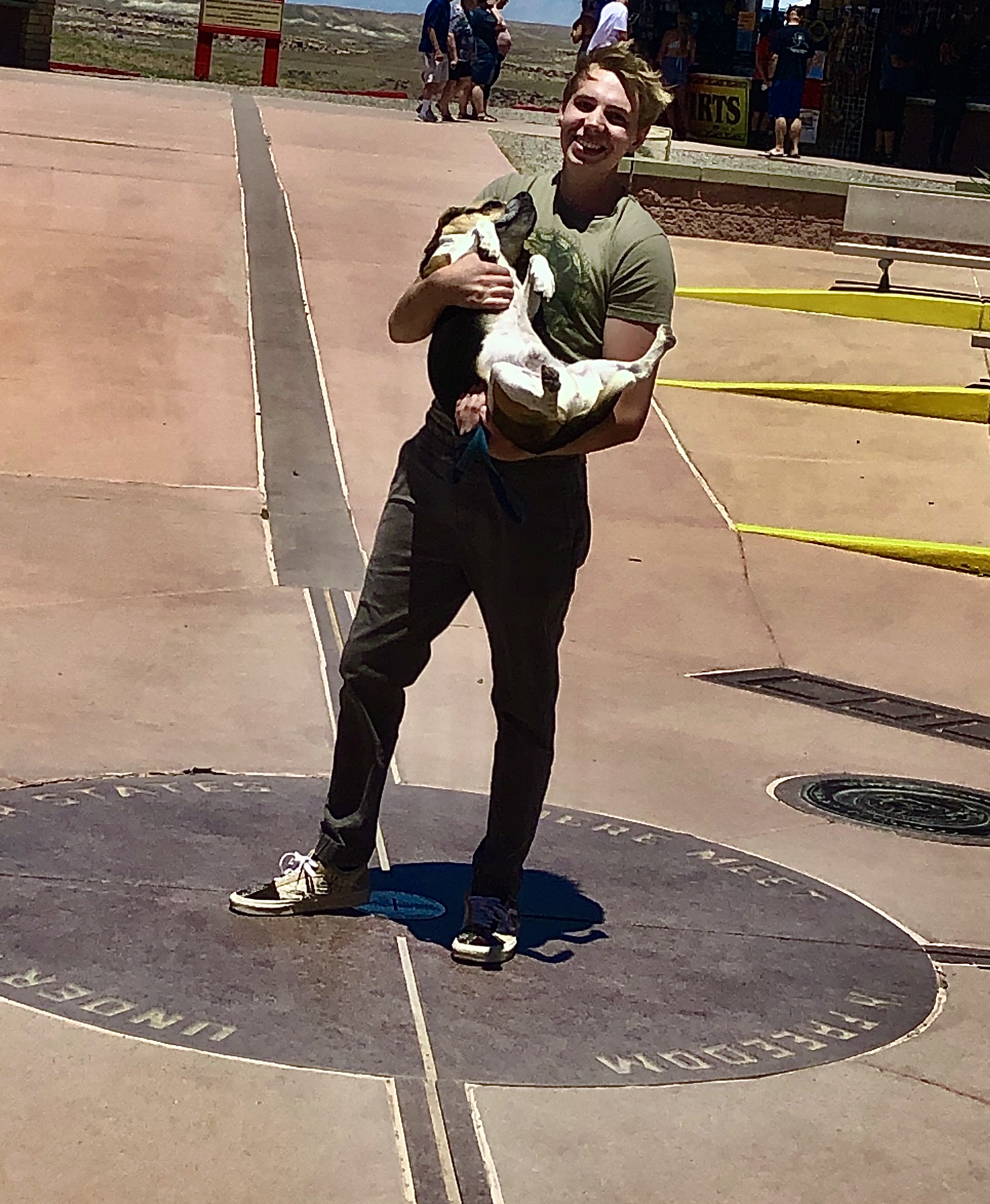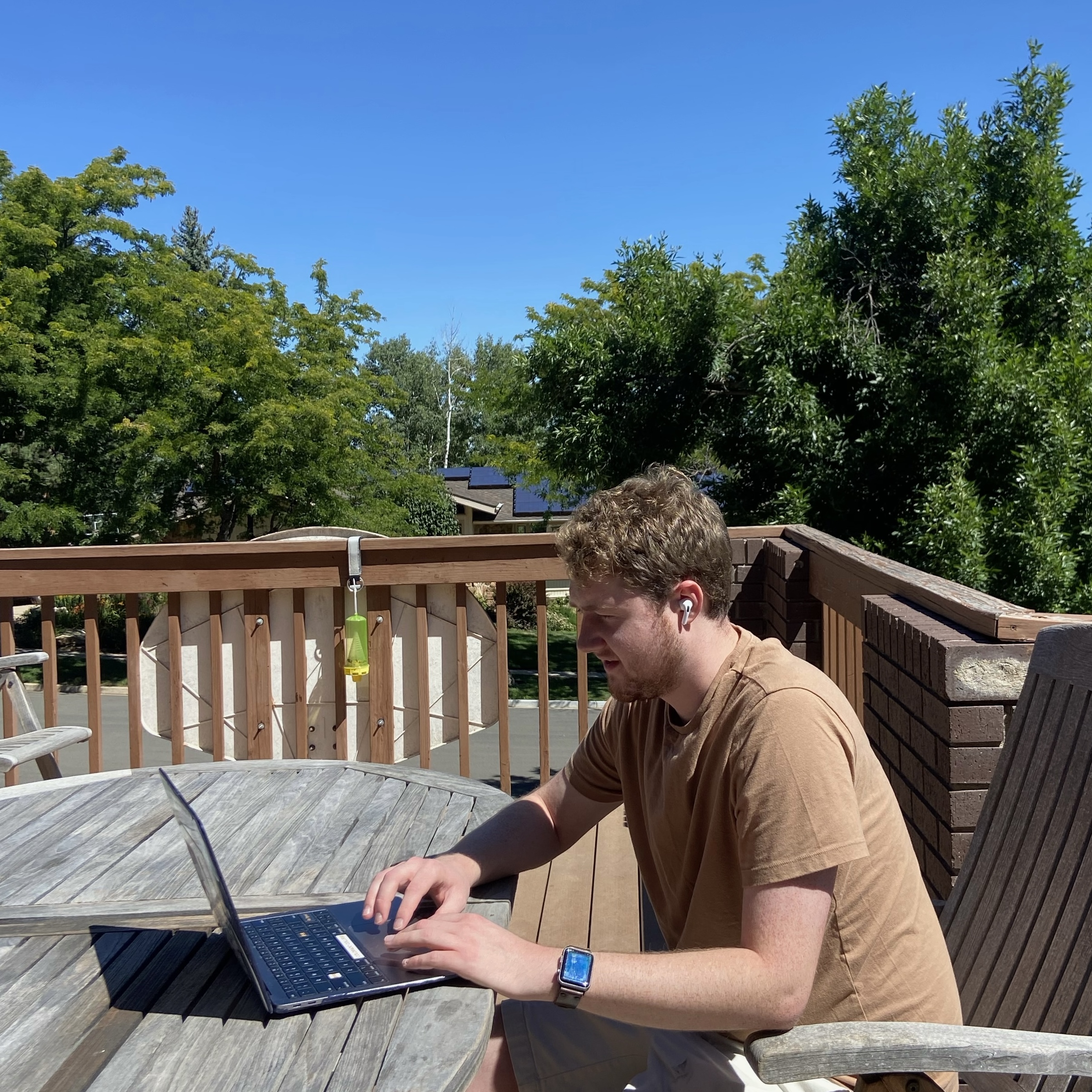Colorado College prides itself on providing students with experiential learning to prepare them for the workforce and to create a more just world. Through the Block Plan, students receive intense, focused instruction from some of the best faculty in the world.
As always, CC is dedicated to continual improvement, including evolving its practices when needed. That’s why, for the first time since CC returned to in-person classes in 2021, CC offered an all-virtual block, allowing students to receive the same prestigious CC education from wherever they are.
Jim Burke, Director of Summer Sessions, says the decision to offer a remote-only Block C was influenced by discussions with faculty members, many of whom expressed positive feedback about remote instruction and its effectiveness in supporting their teaching style and pedagogy.
“For some faculty, remote instruction provided opportunities to enhance student engagement through breakout sessions and online discussion boards,” Burke says. “It was our intention to preserve the progress made during the COVID period by offering Block C remotely. By offering a selection of remote courses, we aim to accommodate all students and enable them to maintain degree progression and enroll in high-demand courses that may not have been available to them during the regular academic year.”
The course offerings for Block C were curated based on student demand and taught by faculty who are comfortable with remote instruction, ensuring a mutually beneficial arrangement.
“This block has proven to be an incredibly successful example of the strengths virtual learning provides,” says Alex Madsen ’24, a Design Studies major and Southwest Studies minor, who took The Drug War virtually in Block C. “I have enjoyed exploring topics of the Southwest and introducing myself to the history, implications, and policies of the Drug War. Despite us all being in different cities and in different time zones, Dr. Guerra has created an environment that still allows us to interact with one another and engage in a way that partially replicates in-person learning.”
“This virtual environment has also allowed me to experience a handful of other opportunities this summer, in various different locations,” says Madsen. “At the start of the block, I was finishing an internship at Eastwing Architects where I joined a small group of five people to work on residential projects in Baltimore. During this time, I participated in many site visits, helped with floorplan measurements, and designed models using laser cutters and 3D printers. During the second half of the block, I spent time in southwest Montana, where I hiked regularly, strolled around Bozeman, and kayaked the Hylite Reservoir. Having the ability to engage in activities outside of class and in different locations, helped me regain a positive view toward virtual learning.
While in-person classes remain the primary format for CC, some professors note how virtual classes can be more accessible to some students, as well as help prepare them for careers in a world where remote working is growing increasingly common.
“Not everyone has the means to take summer courses in person,” says Dr. Wade Roberts, Associate Professor of Sociology, who taught Environmental Sociology in Block C. “It can also be important during the summer to take time to reconnect with family, work in another location, or simply achieve balance in one's life while still tending to intellectual interests. Online options remove some barriers and open up possibilities that didn't exist before.”
“This generation will also be joining a world where remote and hybrid forms of work are regular features,” says Roberts, who added that online courses can help students develop relevant skills for such a world, including working in a virtual lab or preparing for productive online group projects.
“On top of the flexibility of the normal Block Plan, this online summer block was very flexible with my summer schedule,” says Robbie Day ’26, who took Environmental Sociology. “I was able to do the class from anywhere, and still have time left in the day to enjoy summer activities.”
Nick Carse ’24, an Environmental Studies major who also took Environmental Sociology, says depending on the teaching style, virtual classes can be just as engaging as in-person classes because there are fewer distractions outside of class. On the other hand, he notes that they can be somewhat harder for people who struggle to stay attentive during class. Carse took the class from his home in Long Island, where he worked as a boat captain.
Matthew Miramontes ’24 says taking The Drug War virtually was a positive experience. When he wasn’t studying or in class, he was able to take a job exam, fill out job applications, and watch his parents’ house for them in Roswell, Georgia.
D. Harper ’26, who also took The Drug War from his home in Shenandoah Valley, Virginia, finds that virtual classes can be more accessible in some cases.
“For example, as a student with a disability that impacts my physical health, sometimes it can be a bit difficult for me to make it to an in-person class in the morning, so the option to watch the lectures at home and any time of the day is quite beneficial,” Harper says. “However, I also recognize that this depends on the student. Some people may find the lack of a specific routine hard to manage or have more difficulty focusing without an in-person lecture.”
“We learned a lot about the teaching and learning environment in a remote setting during the pandemic,” says Dr. Juan Burciaga, a Block C Visitor in the Physics Department, who taught Building a Sustainable World. “But, for most of us, we did not have a chance to think comprehensively about the transition; we learned how to offer a remote course on the fly. Part of my interest in offering a course during Block C this year was to have the opportunity of visiting those lessons of teaching and learning remotely to see how effective a more thoughtfully constructed course offering can be.”
Burciaga believes that the teaching and learning environment exists in three different aspects for any course. The first is what students experience when they learn on their own, such as studying the texts and working through problems. The second aspect is when students work together in a peer teaching and learning environment, where students work in groups and learn to navigate both the leadership and the participant roles of groups. The last aspect is when students learn from the instructor.
“As the instructor, I am responsible for designing and implementing the teaching and learning environment,” Burciaga says. “But I am also responsible for modeling scientific analysis, inquiry, communication, and participating in a scientific community. Indeed, one of the strengths of the education at schools like CC is the opportunity of working closely with faculty, akin to serving apprenticeships with a variety of disciplinary experts.”
“In person, we balance the three aspects one way but the balance in a remote course is very different and requires much more preparation,” Burciaga says. “Too often, in a remote course, students focus on individual effort neglecting the challenges and opportunities of group learning. And faculty also have trouble successfully modeling remotely what it means to be a member of a scientific inquiry and community.”
Virtual classes can provide more access and opportunities to students, but they also have some downsides, such as Zoom fatigue. However, in true CC-fashion, virtual Block C professors came up with several ways to combat Zoom fatigue, such as assigning offline activities, incorporating breakout rooms and discussions, and encouraging local students to study in person together.
“Recognizing the realities of Zoom fatigue, particularly in a larger class, I do make heavy use of breakout groups to maximize active student collaboration – something that is often easier on Zoom than in person,” Roberts says. “On the whole, there is a small decrease in the amount of collective class time spent on Zoom than there would be in person but more time carrying out research and developing proficiency with the relevant software, like ArcGIS Pro, to examine environmental inequalities.
Roberts utilized the College’s Virtual Lab, which allowed students to carry out the geospatial research part of the class remotely.
“While an online class is different than an in-person one, I have found that it is possible to make them fruitfully interactive,” says Roberts, who taught this class virtually during the pandemic and was pleasantly surprised with how well it worked. “Through a combination of independent student preparation and research, regular use of small group collaboration on Zoom, and class-wide sessions, we can collectively achieve our learning outcomes in an engaging way. I wouldn't have offered the course if I believed otherwise.”
“I think the Block Plan makes virtual learning especially difficult for synchronous classes — not in that the content is harder, but Zoom fatigue is so very real,” says Dr. Eryn Murphy, Assistant Professor of Human Biology and Kinesiology, who taught Introduction to Human Nutrition during Block C.
To combat this, Murphy designed the class to incorporate many discussions, break out rooms, and group activities, with very few lectures. She had her students design a large part of the curriculum on the first day of class, as well as help decide the type of class experiences they prefer, such as discussions or group projects.
“As a result of the great flexibility this provides, this summer’s cohort collectively determined what the virtual block will look like for themselves,” says Murphy, who has taught this class in-person and virtually many times.
“I would never situate virtual blocks as entirely better than in-person blocks and I would never situate in-person blocks as entirely better than virtual ones,” says Dr. Heidi R. Lewis, David and Lucile Packard Professor and Associate Professor of Feminist and Gender Studies, who taught Critical Media Studies during Block C. “Both can be great and necessary for different people and for different reasons. Virtual blocks have the potential to allow students to learn while doing other important things like working.”
“The virtual aspect of this class was the deciding factor for me to take this class,” says Finn Mott ’24, a Business, Economics, and Society major and Creative Writing minor, who took Lewis’ Block C class. “Since I have been fulfilling grant work for the English Department and camping in the Native American reservation land to document the oppression and dispossession, as well as participating in a Congressional Internship on Capitol Hill, I would be unable to take this class if it was exclusively offered at Colorado College. While I deeply value being on campus, this class has permitted me the opportunity to pursue several critical directions in my life.”
COVID restrictions were still in place when Mott got to CC for his first year, so he has had many experiences with virtual classes. However, while he says there are major benefits to virtual classes and virtual options during the summer are a great option, he believes nothing can truly supplement the impact of an in-person class.
“I think that Colorado College should continue to maintain its value on in person classes and the community that comes from being in a singular block,” says Mott. “Fundamentally, there are some aspects of in person learning that cannot be perfectly replicated virtually, such as professor connections and group work.”
What many students love about the Block Plan is the singular focus on one subject, which students share with their classmates for three-and-a-half weeks. For many, this shared focus is a bonding experience that is critical to the Block Plan. Some students say this simultaneous, singular focus is hard to replicate virtually.
“Since everyone has different things going on in their lives and we are all in different places, synchronous coordination has been reduced,” Mott says.
Mott studied abroad in Denmark last fall, which he says was a life altering experience and made him decide to study in New Zealand this coming spring. “This virtual class allowed me to pursue this endeavor and be able to continue my education in new places by fulfilling an all-college requirement over Summer Break.”
Dr. Stefan Erickson, Associate Professor of Mathematics and Computer Science, who taught Calculus 1 in Block C notes that virtual classes can be conducive to students who have diverse learning methods. At the same time, not having the in-person classroom can make it difficult for some students to focus at times. In addition, it can be challenging to keep students interested and engaged with the material with a remote format.
“I used breakout rooms to help sponsor a sense of collaboration and community,” says Erickson, who taught this class remotely for the sixth time.
Erickson pre-recorded lectures that students watched at their own pace, giving them an opportunity to re-watch parts if they didn’t understand part of the material. Class sessions held via Zoom focused on answering questions from students, teaching new concepts and applications, and demonstrating how to use online calculation tools such as Desmos and Google.
“I underestimated how challenging it is to be in an intense block while not in the normal groove of the school year,” says Annie Seymour ’24, a Psychology major who took Calculus 1 in Block C. “For example, I have been working alone at my desk rather than collaborating with peers from class in the library. As it is virtual and a summer block, there isn’t that sense of ‘we are all in this together’ that I feel during the semester.”
Several students learned more about themselves and their learning styles from taking a Block C virtual class. Some realized they prefer learning face-to-face, and others learned they like being able to rewatch Zoom lessons to go over material.
Edgar Romero ’25 took Calculus 1 from his home in Houston, Texas, where he spent valuable time with his family, as he doesn’t get to see them often during the academic year.
Romero says the virtual aspect of the class definitely played a role in his decision to enroll because he also spent the summer preparing for the upcoming basketball season. However, after experiencing a virtual class, he realizes that he prefers in-person classes where he can sit down in an actual classroom and be face-to-face with the instructor.
“It's undeniable that virtual class is super convenient in the summertime for students to be able to Zoom in from anywhere,” says Rio Guzman-Mariscal ’24, a Southwest Studies major who took Environmental Sociology from his home in Los Angeles, California, where he worked as a barista at a local coffee shop. “You can still enjoy your summer and spend time with friends and family if you're back home while also attending classes, which is definitely a huge draw.”
However, Guzman-Mariscal says he isn’t a fan of virtual classes overall and much prefers CC’s typical, in-person format.
“It's really hard to emulate the dynamic of in-person classes and oftentimes does not do the class justice, especially in block format,” says Guzman-Mariscal. “Discussions feel very artificial and don't flow very well, which puts pressure on the professor to cold call on us to say something when sometimes we may not have anything to say—which in turn leads to people saying stuff that isn't really relevant and stalls the discussion even further.”
“I believe that virtual learning can be an incredibly powerful tool in providing a more accessible and flexible experience for future students at CC,” says Madsen. “While I do believe that certain aspects of CC’s strong academic model, such as field trips and hands-on learning, are taken away as a result of the virtual setting, many additional opportunities are offered. By providing virtual blocks, CC is giving students the opportunity to explore their other areas of interest, which may not be possible from our campus in Colorado Springs. This key element of virtual learning embodies CC’s mission and vision to promote an ‘adventurous spirit’ and allow curiosity to be a driver of education.”
There were eight classes offered during Block C this summer, with 120 students enrolled.
“To me, this level of enrollment signifies a positive response from both faculty and students, which is encouraging,” Burke says.









